State of Justice July 2024: Keep Your Eyes On
 Arizona – In Arizona, Life Sentences for Juveniles Test Supreme Court Precedents
Arizona – In Arizona, Life Sentences for Juveniles Test Supreme Court Precedents
The U.S. Supreme Court is considering whether to hear a case involving Arizona’s juvenile sentencing laws, potentially impacting over two dozen youths sentenced to life without parole. Despite the Supreme Court’s 2012 ruling in Miller v. Alabama that mandatory life sentences without parole for juveniles are unconstitutional, the Arizona Supreme Court upheld such sentences last year, citing nuances in state law. Arizona’s attorney general conceded that parole eligibility is constitutionally required, choosing not to defend the state court’s reasoning. The Supreme Court’s decision on this matter, expected soon, could have significant implications for juvenile offenders in Arizona.
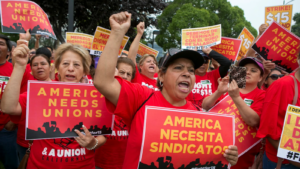 California – Labor emerges as a clear winner from California Supreme Court’s tax ruling
California – Labor emerges as a clear winner from California Supreme Court’s tax ruling
California labor unions won a major victory as the state supreme court removed the Taxpayer Protection Act from the November ballot, eliminating an attempt led by businesses to completely overhaul the state’s tax and revenue system. This ruling benefits unions and Gov. Gavin Newsom who opposed the ballot measure. This decision follows another labor victory withdrawing a different initiative challenging a 2004 law permitting workers to sue their employers on behalf of the state. These developments allow labor to reevaluate its political and electoral priorities and potentially focus on key House races and a ballot measure to raise the minimum wage to $18 per hour. Unions will decide on endorsements next month, clarifying their fall campaign strategy.
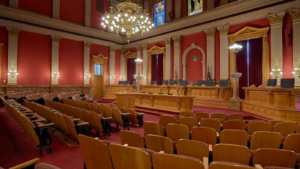 Colorado – Colorado Supreme Court to hear arguments in transgender cake case
Colorado – Colorado Supreme Court to hear arguments in transgender cake case
Baker Jack Phillips, who refused to make a cake for Autumn Scardina’s gender transition, is appealing his case to the Colorado Supreme Court. Baker argues his refusal to make the cake is protected under the First Amendment free speech. The Colorado Court of Appeals previously ruled against Phillips, stating the cake was not protected speech and that the state’s anti-discrimination law did not violate his religious rights. This case will further test the balance between anti-discrimination protections and free speech following a similar recent U.S. Supreme Court ruling.
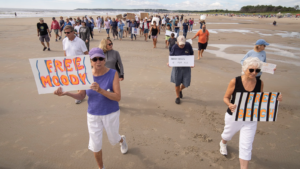 Maine – Beach access lawsuit heading to Maine Supreme Court
Maine – Beach access lawsuit heading to Maine Supreme Court
A case challenging Maine’s intertidal beach ownership laws is before the supreme court. Coastal residents and businesses are hoping to overturn a 1989 decision allowing private land ownership to extend to the low tide line, arguing instead that state ownership of these areas would permit for more public use of those lands. The appeal also requests the public be permitted to engage in activities like seaweed harvesting in the intertidal zones without interference from private landowners. In response to ongoing conflicts, town officials are considering forming a local group to negotiate a resolution.
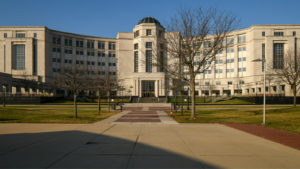 Michigan – High court weighs legality of Benson’s guidance on election challengers
Michigan – High court weighs legality of Benson’s guidance on election challengers
Michigan’s Supreme Court is deliberating the legality of Secretary of State Jocelyn Benson’s 2022 guidelines for election challengers, a case that pits Republican opponents against her office. The guidelines outline procedures for challengers at polling places, including uniform credential forms and restrictions on electronic devices. State and federal Republican parties and election challengers argue Benson bypassed proper rulemaking processes and the guidelines conflict with state election laws. The court’s decision, following lower court rulings against Benson, could impact future election procedures and the secretary’s ability to issue timely instructions.
Michigan – Advocates speak out on minimum wage ahead of Michigan Supreme Court ruling
After the Michigan Supreme Court blocked a ballot initiative calling for a $15 minimum wage from appearing on the ballot, One Fair Wage is pushing for legislative action. The pro-worker coalition argues the $15 minimum wage is necessary to support workers statewide. One Fair Wage is still waiting for a separate ruling from the supreme court on the state’s $12 minimum wage law. Currently, the $12 wage only applies to businesses with over 21 employees, but it was intended to apply to businesses with more than one employee. The language was accidentally changed in the revision process. The court’s upcoming ruling on related legislation could shape future labor policies in Michigan.
Michigan – Michigan’s top court to consider whether to further limit no-parole life sentences
Following a 2022 ruling eliminating mandatory life terms for 18-year-olds, the Michigan Supreme Court will hear a similar case potentially impacting automatic life sentences for 19- or 20-year-olds involved in serious crimes. Cases from Wayne and Oakland counties will be heard, potentially reshaping sentencing laws to consider factors like rehabilitation potential and developmental maturity. If the supreme court eliminates automatic sentences, it would follow similar reform trends across the U.S. and other states such as Massachusetts that raised the automatic sentencing age from 18 to 21.
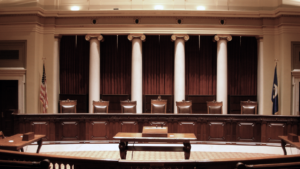 Minnesota – Fargo woman facing 30 years in prison for bong water
Minnesota – Fargo woman facing 30 years in prison for bong water
A controversial case in Minnesota has brought attention to outdated drug laws. The state recently passed a law decriminalizing drug paraphernalia. Despite those efforts, Jessica Beske faces up to 30 years in prison for possessing a bong and bong water that tested positive for methamphetamine residue during a traffic stop in Polk County because Minnesota still classifies bong water as a controlled substance. This created the loophole for Beske’s arrest. When officers arrested her, they equated the bong water and the bong’s weight to pure methamphetamine under sentencing guidelines. As a result, Beske was charged with first-degree possession. Critics argue such prosecutions contradict legislative intent and disproportionately penalize individuals struggling with addiction.
Minnesota – Minnesota Supreme Court to hear case of transgender athlete’s competition participation
The Minnesota Supreme Court agreed to hear JayCee Cooper’s appeal. Cooper, a transgender woman, was denied participation in women’s powerlifting by Powerlifting USA in 2018. Cooper sued, alleging this violated Minnesota’s Human Rights Act. In 2023, a Ramsey County district court ruled in her favor, but the decision was partially overturned by the court of appeals in March. Cooper is being represented by Gender Justice. Jess Braverman, legal director of Gender Justice, emphasized the illegality of discrimination based on gender identity.
 Montana – Republican legislative leadership files amicus brief in housing bill lawsuit
Montana – Republican legislative leadership files amicus brief in housing bill lawsuit
Republican legislative leaders in Montana filed an amicus brief urging the state supreme court to overturn a temporary block on two housing bills passed in 2023. The bills, aimed at addressing Montana’s housing crisis, allow for duplex housing on single-family zoned land and permit accessory dwelling units on single-family homes. The brief argues that the lower court exceeded its authority by halting these laws, claiming they were properly vetted through legislative processes, including public hearings. Montanans Against Irresponsible Densification (MAID), led by a group of homeowners, contend the laws are flawed and oppose efforts to weaken zoning regulations. The supreme court’s decision is awaited amidst ongoing legal and political debates over state legislative powers and housing policy in Montana.
Montana – Montana Supreme Court hears Held v. Montana youth climate lawsuit
The Montana Supreme Court heard arguments in the youth climate lawsuit Held v. Montana, which challenges the state’s environmental protection measures. Plaintiffs, a group of 16 young people, are suing for their constitutional right to a “clean and healthful environment.” They argue the state has failed to consider the climate impacts of fossil fuel projects, threatening their health and environment. A district court previously ruled in favor of the plaintiffs, mandating climate analyses in state project reviews. Progressive stakeholders, including public health experts, conservation groups, and retired justices, support the plaintiffs. State attorneys argue that addressing climate change is a political issue, not a judicial one. The court’s decision will significantly impact Montana’s approach to environmental regulations.
 Nevada – SOS, AG ask NV Supreme Court to make Washoe follow state law, certify election results
Nevada – SOS, AG ask NV Supreme Court to make Washoe follow state law, certify election results
The Nevada Secretary of State and Attorney General are seeking judicial intervention after a Nevada county refused to certify recount results from the June 9 primary election. The three conservative members on the Washoe County Board of Elections voted against certification of the votes; the two Democratic members voted to certify. Secretary of State Cisco Aguilar warned that this could set a troubling precedent for future elections. Voting rights advocates called this move by conservatives an attempt to undermine democracy, erode voter confidence, and spread misinformation, as the outcomes of the contested races remained unchanged after the recount.
 North Carolina – ACC opposes Florida State’s request for NC Supreme Court review
North Carolina – ACC opposes Florida State’s request for NC Supreme Court review
An ongoing lawsuit between the Atlantic Coast Conference (ACC) and Florida State University is before the North Carolina Supreme Court. FSU is asking the North Carolina Supreme Court to review a legal dispute over its ability to leave the ACC due to a dispute of FSU’s Grants of Rights, a contract originally signed and created in North Carolina. FSU has filed a simultaneous case in Florida state courts to avoid the “$700 million” exit fee. FSU is asking the supreme court to halt all proceedings and have the case moved to Florida courts. Last year, North Carolina business court Judge Louis Bledsoe denied their request to halt proceedings in North Carolina. The ACC argues that FSU, along with other members, signed a contract transferring media rights to the conference, which should be litigated in North Carolina.
North Carolina – Attorneys take argument over ‘marijuana smell’ to NC Supreme Court
Attorneys representing Tyron Dobson have brought a significant legal challenge to the North Carolina Supreme Court, arguing against the practice of conducting vehicle searches based solely on the smell of marijuana. Dobson, who faced charges including possession of a firearm, contends that his guilty plea was influenced by an unlawful search during his arrest in Greensboro in 2021. Attorney Benjamin Kull filed the petition, highlighting the difficulty in distinguishing between legal hemp and illegal cannabis by scent, raising constitutional concerns about unwarranted government intrusion.
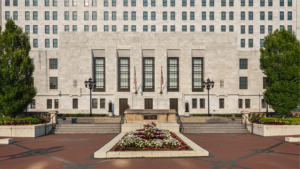 Ohio – State turns to Ohio Supreme Court after former auditor’s public corruption conviction thrown out
Ohio – State turns to Ohio Supreme Court after former auditor’s public corruption conviction thrown out
Following the reversal of former Butler County Auditor Roger Reynolds’ corruption conviction, Ohio’s Attorney General Dave Yost and Solicitor General T. Elliot Gaiser are urging the state supreme court to step in. Reynolds, accused of pressuring a local school district to fund a private golf facility where his family resided, was initially convicted of unlawful interest in a public contract. While acquitted of bribery charges, the appeals court ruled insufficient evidence for his conviction, potentially allowing Reynolds to re-enter public office. Yost argues that upholding this decision undermines Ohio’s anti-corruption laws, eroding public trust in government accountability.
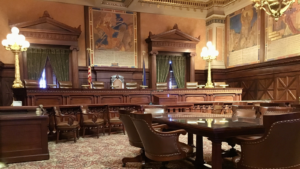 Pennsylvania – Pennsylvania Supreme Court to examine felony murder sentencing
Pennsylvania – Pennsylvania Supreme Court to examine felony murder sentencing
The Pennsylvania Supreme Court will review a case this fall that could impact numerous Philadelphia inmates serving life sentences for felony murder. This case, brought by Derek Lee, challenges the constitutionality of his mandatory life sentence. Lee was sentenced under a state law that allows individuals to be charged with felony murder for deaths occurring during a felony, even if they did not kill or intend to kill. Advocacy groups and Gov. Josh Shapiro support Lee’s appeal, arguing the current law is unjust. However, Shapiro suggests that new legislation, rather than a court ruling, would be a more effective solution.
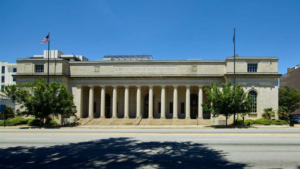 South Carolina – Compromise reached on how SC judges are elected. Here are the details of the planned reform
South Carolina – Compromise reached on how SC judges are elected. Here are the details of the planned reform
Following a long legislative debate over the integrity of judicial selection in the state, South Carolina will reform its judicial selection process. The state will still select their justices by legislative election, but the reform bill made significant changes to the Judicial Merit Selection Commission (JMSC). The JMSC will serve staggered, limited terms and include governor-appointed members, a new feature of the commission. Currently the commission is a 10-member body with 5 appointees by the House and Senate. Under the new reforms, there will be four members appointed by the House (three will be representatives and one attorney), two members appointed by the Senate President (one a senator and one attorney), two members appointed by the Senate Judiciary Chairman (both senators), and four members appointed by the governor (all attorneys). The reform bill also increases the slate of candidates the JMSC sends to the legislature from three to six. Despite changes, the confirmation vote tally remains 170, still favoring House members and giving them more influence than the Senate over the selection process.
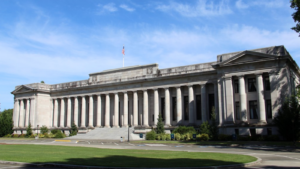 Washington – WA Supreme Court will consider dispute over printing budget effects of initiatives on ballots
Washington – WA Supreme Court will consider dispute over printing budget effects of initiatives on ballots
The Washington Supreme Court is set to rule on whether three proposed initiatives, which seek to overhaul major state programs and revenue sources, should include concise statements on the November ballots outlining their potential financial effects. This issue arose after Republican leaders contested these “public investment impact disclosures,” arguing they mischaracterized the initiatives. After a lower court dismissed their challenge, they appealed to the state’s highest judicial body, aiming for a decision before the ballots are finalized in early August. The case highlights ongoing discussions about transparency in voter initiatives and their economic consequences.
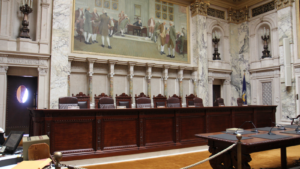 Wisconsin – Wisconsin Supreme Court will hear a challenge to governor’s 400-year school funding veto
Wisconsin – Wisconsin Supreme Court will hear a challenge to governor’s 400-year school funding veto
Wisconsin Supreme Court justices will review a legal challenge to Gov. Tony Evers’ partial veto extending school funding increases. During the 2023 budgeting process, Evers partially vetoed the 2023-24 and 2024-25 budget line to alter the language to extend the $325 per student increase until 2425. The Wisconsin Manufacturers & Commerce Litigation Center claims Evers exceeded his authority, and the court has set a briefing schedule. Historically, Wisconsin governors have used partial vetoes to reshape budgets. With the court’s liberal majority, Evers’ veto is likely to be upheld.
Wisconsin – Wisconsin Supreme Court seeks investigation after abortion draft order leaks
The Wisconsin Supreme Court’s chief justice is calling for an investigation into the leak of a draft order revealing the court’s agreement to hear Planned Parenthood’s case challenging the state’s 1849 abortion law. Chief Justice Annette Ziegler condemned the leak, stating all justices support the investigation. The court, now with a liberal majority, will consider whether access to abortion is protected by the state constitution and the legality of the 175-year-old law.
Wisconsin – Wisconsin Supreme Court to decide right to abortion
The Wisconsin Supreme Court’s liberal majority has agreed to hear a case that will determine the future of abortion access in the state. The case aims to establish a constitutional right to abortion in Wisconsin. First leaked in a draft reported by Wisconsin Watch, the supreme court order grants an appeal of a lower court ruling invalidating the 1849 law thought to be an abortion ban, finding it does not apply to medical abortions. Pro-life groups sought direct intervention but were denied, though they can submit briefs.

